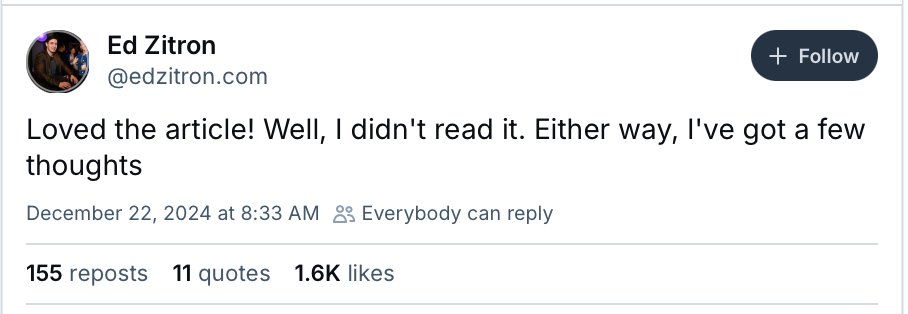Mark All as Read

Folks wrung their hands a lot this year about reading. "No one buys books," Elle Griffin argued this spring, although apparently Bible sales are surging, as – according to The Washington Times at least, "Gen Z is sick and tired of predecessors' self-centered godlike hubris." Joke's on The Times, of course, as we all know Gen Z doesn't read. Or at least, that's been the dominant narrative this year – a lot of “kids these days” kind of stories, lamenting that even Ivy League college students don’t do the assigned reading. Even Ivy League college students — my goodness, what is the world coming to?
I mean, I wring my hands a lot too when it comes to our collective reading habits. (For what it's worth, Americans do buy over a billion books a year. Reading those books, on the other hand, is probably another matter.) I worry about the buying and reading of books, particularly as someone who struggles to make a living writing things for others to read.
I worry too that chastising people for not reading always makes one vulnerable to charges of elitism. But damn, I fret even more that we’ve fully embraced a series of beliefs and technologies that are profoundly anti-reading, and as such, we're spiraling farther down into a deeply anti-intellectual, anti-education period of history. Of course, it’d be hard to pinpoint a time in this country at least when we weren’t. I don’t believe “the good old days” of reading actually exist — days when everyone read deeply, when everyone had access to diverse literature, when everyone eagerly and earnestly engaged in reading and thinking through what they read together.
That said, it’s not hard to see that the practices of reading and of writing — practices that are inextricably connected — are pointedly threatened by those who promote artificial intelligence as a more efficient way to communicate, to produce and consume information. And their emphasis on efficiency is key.
“I’m very skeptical of books. I don’t want to say no book is ever worth reading, but I actually do believe something pretty close to that...I think, if you wrote a book, you f—ed up, and it should have been a six-paragraph blog post.” — Sam Bankman-Fried
Reading has long been viewed as "a waste of time," hence the rise of snake oil salespeople like Evelyn Wood who, as Marcia Biederman chronicles in her excellent book Scan Artist, "convinced the world that speed-reading works." Speed-reading is largely bullshit – whether sold to you as a mail-order course or as software-as-a-service. While speed-reading might show you ways to scan and skim text quickly, most research shows that there's a huge trade off in comprehension — not great if you’re reading to learn or to understand. Appealing perhaps if are you simply interested in marking something as read.
More and more, it's the latter that’s the priority – speed and superficiality – as everything we do is subsumed by the impulse to optimize. It’s an “optimization culture” we live in now, where everything we do is tracked, measured, ranked, and rated, again in the quest to be more efficient. Faster is cheaper is better — or so the story (of machines, of capitalism) goes.
And hence the big push this year for AI-generated summaries. Even the smallest amount of text is now too much, too time-consuming to read, exemplified by Apple, which recently rolled out its AI summaries for some of the quickest and shortest messages in our day-to-day lives: the text message, the app notification.
A book – any piece of writing, really, but particularly a long piece like a book – is so much more than "the point" (non-fiction) or "the plot" (fiction). Indeed, summarizing is one of the earliest things young children learn to do with their newfound reading skill, and as such it might be one of the least sophisticated responses imaginable to a piece of text. And I worry, I really do, that so many people seem to have convinced themselves that surrounding themselves with summarization is smart – because, of course, it is efficient.
Reading can be slow. It can be quite challenging work – and not simply because our attention has been increasingly conditioned, fragmented with distractions and disruptions. And yet from the considered effort of reading comes consideration. So it isn’t simply that we no longer read at length or read deeply; we no longer value contemplation.
To optimize our lives, we feel compelled to spend an inordinate amount of time setting up “systems” to get things written, to get things read. (Side-note: I recently downloaded Readwise, the software that Luigi Mangione, the alleged CEO shooter, was apparently a user and fan of. Readwise promises AI-generated summaries and spaced-repetition to minimize the time spent reading and maximize retention.) All this time bookmarking, all this time surfing, all this time sharing, all this time clicking, all this time moving an article from the browser to an app and from an app to another app, but no time — how weird — for reading books. “Water, water everywhere and not a drop to drink,” as some Romantic once opined in a poem with far too many words.

It's all a bit ironic, isn't it – the lamenting that students don't / won't read when so many social signals insist that reading is some sort of fool's errand. And if reading is a waste of time, so too is writing – students pick up this message as well.
Conveniently, generative AI promises now to both churn out prose – too much, too banal to read, let's be honest – and because it's so much and so banal, to summarize all this content in turn. A lot has been written about how generative AI undermines the practice and profession of writing; but clearly it does the same for reading too. Why write if only a robot will read it; and why read if a robot has written it?
And surely that's a message we're sending to students younger and younger. Houston ISD, the largest school district in Texas, just announced a deal with a company called Prof Jim to provide AI-generated reading passages for its students. While we all know how this stuff gets marketed – "personalization" and so on – it's truly the most depersonalized, dehumanizing curriculum possible. The use of AI implies that students aren't worth the effort. So why then should students make any effort in turn?
There’s a real thoughtlessness in all of this — not just the emptiness in the intellectual endeavor of robot-authorship, but a lack of consideration for audience, for community, for the reciprocal relationship of writer and reader. If, as some scholars argue, learning to read does not just build cognition but helps develop empathy – that is, young readers become immersed in stories outside their own experience and thus see the world differently – what are the implications when adults cannot bother to tell stories to their children?
AI in education demonstrates that we do not care.





